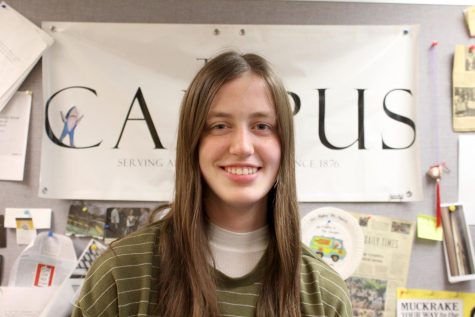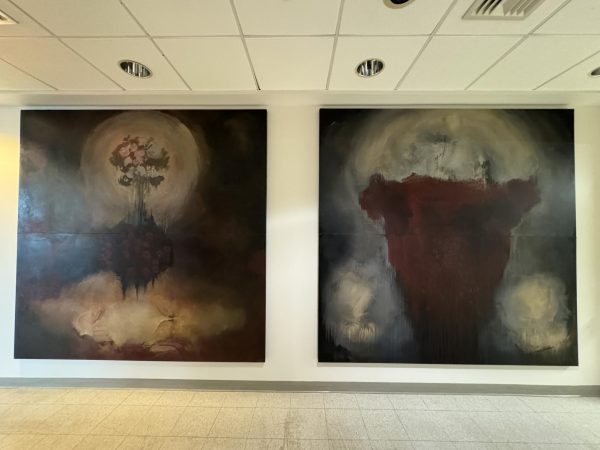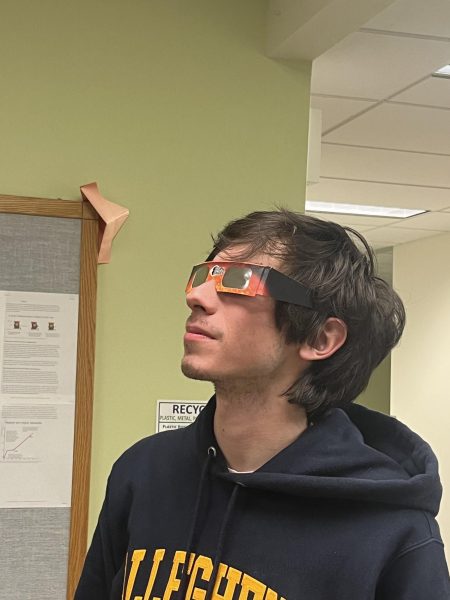Studying 101
Allegheny professor and student weigh in on effective study methods in preparation for finals
It is just about finals season, also known as the time during which students spend two weeks trying to review four months’ worth of material. As the library begins to overflow with sleep-deprived students, coffee and hopelessness, it can be easy to become overwhelmed by the sheer amount of work to do. Desperation may lead some to look online for the best study method to guarantee an A at the end of the semester. Look no further — the answers are now right in front of your eyes.
A disclaimer up front: There is no magic method to pass every final at the end of the semester. Studying is a wholly individualistic process and there will never be one uniform method that works best for everyone. However, there are a few key methods to incorporate into study processes that have been shown to improve memory retention and recall abilities.
So, where to start — or rather — when to start? According to Visiting Professor of Psychology Stanislaw Kolek, students should begin preparing for finals at the beginning of the semester and continue studying throughout the year. Students that work hard all year, do their readings and consistently participate in class, hardly need to study at the end of the year, Kolek explained, as they already understand the material on a deeper level.
“So you start early, you save yourself a lot of stress, you save yourself a lot of time,” Kolek said. “If you’re a student that flies through the whole semester without really putting in a lot of effort and then tries to prepare at the end of the semester for the final because let’s say the final is a 50% chunk of the grade or something like that, give yourself at least a week.”
Chunking
To clarify why students following along with class do not need to study as much, Kolek explained one of his most recommended study techniques: chunking.
“Chunking is this fantastic phenomenon, where if you study in smaller amounts for an extended period of time, you improve your ability to recall and recognize information,” Kolek said.
Quite literally the antithesis of cramming, chunking gives students more time to review the material, develop a better understanding of it and identify areas they are struggling to comprehend. Students can chunk their work based on time, concept, or subject matter.
Dylan Hlavenka, ’25, explained that they break up their days by class, dedicating each study day to one or two subjects. As a business and economics double major with a French minor, Hlavenka has quite the course load. To avoid the build-up of stress, they try to be proactive about their coursework.
“I usually study pretty much as soon as possible,” Hlavenka said. “It doesn’t hurt to be prepared for it.”
Picking a study environment
Hlavenka typically studies in Grounds for Change or the Lawrence Lee Pelletier Library. They enjoy the friendly environment of GFC, finding it to be a good place for collaborating with others. The library, on the other hand, is where they go for quiet study time.
Having a set study space is important for most students, Kolek explained. Environmental accountability, such as other students working, helps many stay on task for fear of being judged by others for procrastinating. Another factor to take into consideration when choosing a study space is where the actual test will take place.
“If I’m going to tell my research methods students where they should study, probably the top place I would tell them to study is Carnegie Hall,” Kolek said. “Study here for an hour or half an hour every day just going over whatever you’re going to be going over.”
Studying in the actual academic buildings may feel odd at first, but Kolek recalled how this change really helped in his college career. Kolek started studying in the library more after a substandard sophomore year.
“Now in terms of what kind of space in the library I liked for me, as long as I was very concentrated on what I was working on, it didn’t matter if there were people around if there was a lot of noise, hustle and bustle, that type of stuff,” Kolek said. “It kind of goes away because at that point I was in a place where learning happens, right? So it did help to be at that location where for example, I will actually be taking the exam.”
Study with friends or go it alone?
Another factor to consider when studying is whether to study in groups. For process-based exams, such as statistics, Kolek highlighted the benefits of talking through the process as a group. However, for recall-based exams, studying alone might be beneficial depending on the level of understanding a student has on the topic. In fact, group study might actually be more harmful than helpful for some.
“The Köhler effect is a phenomenon in performance psychology, where the weakest member of the group feels like they’re doing well because everyone else is doing well which ends up, of course, affecting the entire use of performance,” Kolek said. “Those who are not actually doing well — in that study strategy — they tend to do worse, while those who are already doing well tend to do better, but as a group performance is going to suffer.”
To overcome this, Kolek recommended studying with people of the same skill level. Once your understanding of a topic has reached the same level of those doing well in the course, then you can rejoin the higher group.
Write your way to success
You’ve set aside an hour every day, found a place to study and people to study with — or without — you’re good, right? Well, there are a few more factors to consider. The question of how you are going to study still remains. Chunking is a technique that works really well at breaking up time but does not provide strict guidelines for what to do during the time that is set aside. For actual study techniques, Kolek said his number-one recommendation will always be writing down the material.
“When I had a really big exam coming up, I would just write everything I know,” Kolek said. “I would write pages just to get everything I know down on that piece of paper read through it. If I was wrong here, I can correct that. If I know that I’m wrong about a certain definition or how things are connected, or I’m just not communicating it well, I can easily correct it by having already done it once. So you’re almost like taking the exam. The first time, (you are) able to correct it. And then you’re able to do the exam a second time with hindsight, right?”
Hlavenka, on the other hand, preferred to use websites that test their knowledge, such as flashcard giant Quizlet. After reviewing notes, they used Quizlet as a way of testing their understanding of the material. Additionally, Hlavenka found it helpful to stop by their professor’s office hours to get their notes checked. This way they are “studying the right things.”
What to avoid
While it is important to know what works best for studying, it is equally important to understand what things to avoid while studying. Cramming is the number-one thing to avoid while studying, according to Kolek.
“Good luck getting anyone to actually do that,” Kolek said, tone suffused with sarcasm.
For those who choose to procrastinate and cram anyway, think twice before staying up super late the night before an exam. Research at the Perelman School of Medicine has shown that losing sleep in this way hurts performance much more than it helps.
“If you’re sacrificing sleep to study, you might also be sacrificing your physical health because you’re not going to feel as well during the exam,” Kohler said. “Also, your memory is not going to reboot just because you crammed a little bit before, but it’s more likely going to help you if you actually get the amount of sleep you need.”
Along with getting an adequate amount of sleep in the days leading up to an exam, students should also avoid drinking or taking any mind-altering substances during studying. State-dependent memory, Kolek explained, means that memory depends on what state of mind a person is in. If someone was drunk or hungover while studying, that is a different state of mind than when they are sober, which they will hopefully be during their exam. Thus, using mind-altering substances during studying makes recall of material much harder.
“I’ve also heard this very funny take on state-dependent memory — which is if I’m drinking while studying, all I have to do is drink when I take the exam and I’m in the same state, I’m going to be better at taking the exam, which has been proven false,” Kolek said. “Actually, there’s a decrement in performance. So yeah, avoiding that would be a smart choice.”
Taking effective study breaks
One final way for students to update their study routine is actually by learning how to not study. Taking breaks while reviewing material is essential in preventing burnout, as Hlavenka explained. However, taking breaks can lead to a loss of motivation and ultimately procrastination. To prevent this, Kolek explained a few ways students can take more effective study breaks.
Instead of completely walking away from studying, Kolek said, try switching topics. This gives the brain a break from looking at the same material while still keeping it engaged in the learning process. This very method is often used by pre-med students. Kolek found this technique to be very effective, as it prevents the brain from disengaging.
“Definitely avoid your phone if you can,” Kolek said. “If you go to simply scrolling through something your entire attention network has changed what its focus is and changed the way that it’s operating. That is going to be difficult to reset.”
Additionally, exercising during study breaks is another way to refresh the brain and boost performance. Kolek recommended stretching or going for a brisk five- to ten-minute walk to reboot. Hlavenka often uses this method, stopping down in McKinley’s during their breaks to get snacks.
Perhaps the best way to stop procrastination during breaks is to set a timer, Kolek said. Having another environmental stimulus to hold him accountable really helped during his college years.
“I will set like a 15-minute timer when I’m taking a break and when I hear that timer, I know 15 minutes is up,” Kolek said. “It almost feels like it’s yelling, ‘Hey, get back to studying!’”
While preparing for finals may seem like a daunting task, it does not have to be. Kolek emphasized the importance of making studying something enjoyable to do. Studying while stressed is not only miserable but ineffective as well. As with all things in life, he said, try to make it enjoyable.
As the month of May steadily approaches, take a second to review and revamp your study techniques before downing your second Monster of the night.
“Write everything down, chunk as much of your studying as possible and be in a productive environment,” Kolek said.

Caroline Maye is a first year from Chicago, Illinois. She plans to major in Political Science or History with a minor in Journalism in the Public Interest....




